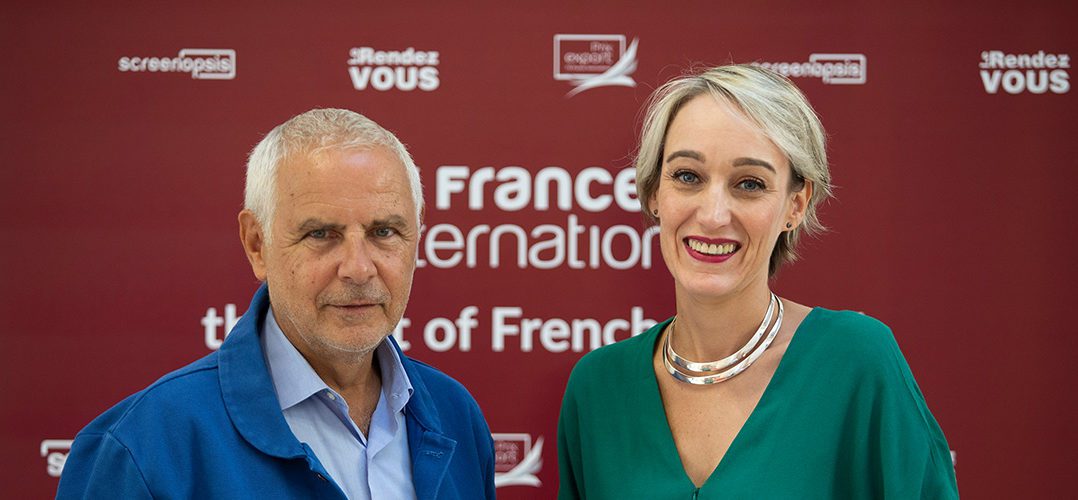What is the key mission of TV France International?
Hervé Michel: The key mission of TV France is to support French soft power through the export of French TV programmes in all genres. That is why our main financial support comes from both the Ministry of Culture, through the CNC, and the Ministry of Foreign Affairs.
Sarah Hemar: Created 25 years ago, our role is to give the French companies all they need to make French content travel. Concretely it means taking them to all key markets around the world – MIPTV and MIPCOM of course, but also the ATF and a number of the genre-focused markets, for example Sunny Side of the Doc. We also provide them with Screenopsis, an online library that makes the programmes of our members available to buyers worldwide, 24/7. And, importantly, we organise our own events, branded Les Rendez-Vous, The biggest of those takes place in Biarritz every September. It gathers around 500 people, two-thirds of them buyers, in a very special setting to do deals.
The international marketplace for French drama content is very strong. Why is this happening now? What has changed?
HM: What has changed really is that French professionals have integrated international dimensions into their programmes. They have evolved a lot in how they develop an idea, finance it and even produce it in terms of style, volume, and so on.
SH: There is probably also a generational dimension to it. The Erasmus generation, which has been educated while traveling the world, been exposed to different cultural trends, and is now moving into responsible positions. They are thinking global from the start. And the VOD platforms have opened a completely new market for niche and exotic content. We can now enjoy Spanish or South Korean content in France, while a French drama can find an audience in India or in the US.
French content aimed at kids is particularly strong on the international market. Why is this is the case?
SH: Because France excels at Kids content! Because we have a network of talented professionals at every step of the process: writers, animators, producers, distributors. This probably has roots in the French tradition of ‘bandes dessinees’ with writers who had already conquered the world a long time ago, creating the right conditions for both new talent to emerge and travel the world. France also has a good network of schools for animation. All of this creates the right environment for success.
HM: Animation has been the driving force of French audiovisual exports for years. In 2017, again, animation was the Nº1 exported genre with more than one-third of all sales valued at €75.6m. Moreover, the diversity of style and format is striking. We are starting to feel the emergence of adult animation again, which we hope can be a new area for growth.
Historically French cinema has punched above its weight across the world, in part because of government support. Has television benefitted in this way also?
SH: Yes, sure. There is a great tradition in storytelling, inherited from French literature, from which both TV and Cinema have benefitted. The technical quality of French cinema, the talented crews and most recently, actors and directors, are all now crossing the frontier between cinema and TV much more easily. At the end of the day, it all comes down to the great story everybody wants to tell.
HM: The French government – through the same institution, the CNC – also supports television financially. And this support is key for producers to be able to grow innovative ideas all the way to making sure the finished programmes travel the world –with the help of TV France for TV and Unifrance for cinema. France invented the moving picture, and so has a reputation to live up to, whatever the format or channel of distribution.
What challenges has the changing media landscape presented to TVFI and its member companies?
HM: I think we all face the same challenge globally. And a challenge that is also a great opportunity: the digitalisation of media consumption. It both opens new markets with local platforms being very hungry for original and different types of content, while at the same time it makes the business more complex and difficult to navigate, with multiple stakeholders.
SH: But, hey! At the end of the day, we are all consuming much more content than we used to! And more content means more business. And more business means more opportunities for French programmes. The SVOD landscape is in the making. It will be interesting to see what the new coming competition will bring and how it will reshape the ecosystem. I expect the power balance to come back to more… balance, I hope.
What kind of support and assistance can TVFI – and the French industry in general – offer to international companies wishing to work in France with French partner companies?
HM: First, we can explain our market, which is not always easy for newcomers – and also introduce them to the partners that would suit them best. And just as we facilitate access to international buyers for French distributors, we are willing to assist potential financers and/or producers to find the right partners to develop great content. For example, we are the French representative and manager of the Global Alliance network and platform developed by PACT and launched last MIPCOM. This network aims enable project holders and project financers, to find each other online to kick-start international collaboration. We hope this project is a first step to intensify worldwide collaboration around audiovisual content.
There are subsidies and incentives available for production companies wishing to film in France. How do non-French companies access these?
SH: That is true are and France is a very attractive territory to many international producers. But alongside the financial incentives that are available, such as the tax-credit system, international companies should also consider the diversity of locations France can offer, and the quality of the technical teams who are recognised worldwide for their excellence.
Our colleagues at Film France are the right partners to help in that regard. Film France is the one-stop-shop for all projects in France. This agency promotes France for filming, animation, VFX and post-production. Film France also assesses the eligibility of projects for the French Tax Rebate for International Production. Like TV France and Unifrance, Film France is funded by the CNC.
France’s strong reputation in the sphere of audiovisual content is there for a reason. And we are very generous in sharing this excellence with the world.
This and more in the MIPTV News Focus on France issue, out April 9. This article was written by Julian Newby and edited for MIPBlog.




